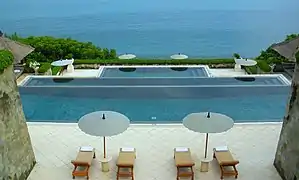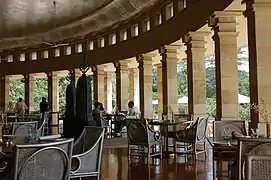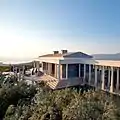Ed Tuttle | |
|---|---|
 | |
| Born | Edward Burnham Tuttle Jr. August 11, 1945 Seattle, Washington |
| Died | June 21, 2020 (aged 74) Paris, France |
| Nationality | American |
| Alma mater | University of Washington |
| Occupation | Architect |
| Notable work | |
| Partner | Christian Monges |
Edward Burnham Tuttle Jr. (August 11, 1945 – June 21, 2020) was an American architect and interior designer best known for his works of hotel architecture. Among his most celebrated works is the Amanpuri hotel in Phuket, for which he was credited with setting a novel standard in resort design.[1] Tuttle's design style has been described as simple, orderly and tranquil, and focusing on the comfort of a space.[2] In 1977, he founded Design Realization in Paris, where he had been based until his death in 2020.
Tuttle and his firm kept a relatively low profile despite the considerable media recognition of his works; it was suggested that Tuttle's success as an architect may have relied on his discretion.[3]
Early life and education
Tuttle was born in Seattle, Washington, on August 11, 1945, to Edward Tuttle Sr. and his wife Ruth, then owners of a steel mill. He was descended from the designer of the Georgia State Capitol, architect Franklin Pierce Burnham, for whom he was named. He enrolled at the Portland State University to study interior design and architecture in 1963 and transferred to the University of Oregon before later graduating from the University of Washington in 1968. At Washington, his studies were influenced by the works of modernist architects Mies van der Rohe and Frank Lloyd Wright, and primarily focused on the latter's renowned work, Fallingwater in Pennsylvania.[4]
Following his graduation in 1968, he briefly worked at the design studio of the San Francisco-based department store, Gump's. Whilst there, through a colleague, he assisted in designing the house of a member of the Pritzker family, owners of the Hyatt Corporation and founders of the Pritzker Architecture Prize.[5]
Early career
In 1968, following his brief stint in San Francisco, he joined Dale Keller and Associates in Hong Kong, who were responsible for the designs of Mumbai's Taj Mahal Hotel and the Hong Kong Regent. With the Kellers, Tuttle assisted in the design of several villas on the Saronic islands of Hydras and Mykonos in Greece, and later worked on the winter palace of Iranian Shah Reza Pahlavi on Kish Island shortly before the Iranian Revolution of 1978.[6][7]
In 1977, Tuttle relocated to Saint-Germain-de-Prés, Paris, and established the architectural firm, Design Realization Ltd., which he ran together with his colleague and partner, Christian Monges.[8] Despite settling in France, he continued to travel frequently for the next decade to oversee various private residential and hospitality projects worldwide.[9] His pattern of travel later led to Tuttle being dubbed by several books and magazines as a "Livingstone of modern times" after Scottish explorer, David Livingstone.[10][7]
In 1981, Tuttle updated the design of Villa Batujimbar in Bali; the villa had been the personal residence of Indonesian-hotelier Adrian Zecha, who he first met in Hong Kong. The renovation led to the creation of black-tiled pools, which later spurred a trend of such pools throughout the tropics.[4] Villa Batujimbar became the precursor project that led to his long term cooperation with Zecha.[11]
Hotel projects

Tuttle's projects for Aman Resorts has been credited to define the hotel group's calm design style.[12] His works for the chain garnered considerable media attention and had been featured on numerous books on architecture and design.[13][14][15] His designs, as part of Aman Resorts' larger portfolio had been claimed to have significantly changed hospitality design, and influenced the works of other hospitality architects like Bill Bensley.[16][17][18]
In 1986, Adrian Zecha hired Tuttle to design a resort on a coconut grove on Phuket's Pansea beach in Thailand. He studied Thai traditional architecture and classical teak houses before designing the hotel; this pattern of local cultural sensitivity continued with his ensuing projects. The project's design claimed to capture the essence of Thai design and prioritised a design that was liveable; markedly an antithesis to other luxury hotels of the day.[19] Tuttle attributed his approach to prioritise the location's cultural context and the structure's impact to the surrounding environment; it was reported that Tuttle elected to built around the coconut trees on the site's grove instead of cutting them down.[9][20] The 30-room resort opened in 1988 as Amanpuri, receiving significant media coverage on the hotel's radical form and original style; it became frequently credited as a template for future luxury hotels worldwide despite not advertising.[21][4] Following the completion of Amanpuri, Tuttle developed a persisting friendship with Zecha, which led to his long term cooperation with the hotel chain.[22]
In 1991, he and Australian architect, Kerry Hill collaborated in the design of the Sukhothai Hotel in Bangkok, Thailand.[23][2] More hotel-related projects ensued in 1992, with the opening of Amankila in Bali and Le Melezin in Courchevel. The former, designed and built onto a cliffside met similarly much praise from various design critics.[24][25][26] In 2003, Tuttle designed the interiors of the Park Hyatt hotel in Milan, occupying a 130-year-old former office building. Tuttle's design for the hotel was featured in an article in The New York Times.[27][28] Tuttle continued designing hotels with Aman up until 2012, marked by the opening of the Amanzoe resort in Ermionida, Greece.[29]
Later career and life
Later in his life, he designed the Golden Rock House on Nevis, St. Kitts and Nevis, owned by artist Brice Marden, an old friend of Tuttle's; he reportedly refused payment for the design. The house was later turned into an inn by Marden.[30][12] In 2009, Tuttle's name was included in Architectural Digest's 2010 AD100 list, which recognises influential interior designers and architects around the world.[31][32]
In 2019, Tuttle's name was mentioned as part of the widely published contact book of American financier and sexual offender Jeffrey Epstein, along with fellow designers and architects, Muriel Brandolini, Jean-Michel Gathy, Ricardo Legorreta, Peter Marino, and David Rockwell. Tuttle's architecture practice had designed the main-house on Epstein's 70-acre Little St. James Island in the U.S. Virgin Islands in 2003.[33] His name was also mentioned in Epstein's flight logs, containing lists of alleged passengers who have travelled Epstein's personal jet; the document received significant media attention following its publication in 2019.[34][35]
Tuttle continued living in France with Christian Monges, a lawyer with whom he had been in a relationship.[2] Tuttle died in Saint-Germain-de-Prés, Paris on 21 June 2020 of a brain tumour.[36]
Selected works
- Amanpuri, Phuket, Thailand (1988)
- Sukhothai Hotel, Bangkok (1991)
- Amankila, Bali, Indonesia (1992)
- Le Melezin, Courchevel, France (1992)
- Amanjiwo, Magelang, Indonesia (1997)
- Amangani, Jackson Hole, Wyoming (1998)
- Amanjena, Marrakesh, Morocco (2000)
- Park Hyatt Hotel, Milan, Italy (2003)
- Amanbagh, Rajashtan, India (2005)
- Park Hyatt Vendome, Paris, France (2002)
- Amanzoe, Ermionida, Greece (2016)
Further reading
Gallery of works
 Library at Amanpuri (1988)
Library at Amanpuri (1988) Amankila (1992)
Amankila (1992) Amanjiwo (1997)
Amanjiwo (1997) Amanzoe (2012)
Amanzoe (2012) Park Hyatt Milan (2003)
Park Hyatt Milan (2003)
References
- ↑ "Aman architect Ed Tuttle passes away". Sleeper Magazine. 2020-06-23. Retrieved 2021-07-29.
- 1 2 3 Gagliardi, Jason (5 June 2005). "Peace of mind". South China Morning Post. Retrieved 2021-07-29.
- ↑ "Passing Of An Architectural Legend - Edward Tuttle". LUXUO. 2020-06-24. Retrieved 2021-07-29.
- 1 2 3 "Ed Tuttle obituary". The Times. ISSN 0140-0460. Retrieved 2021-07-29.
- ↑ Palling, Bruce (19 August 2020). "Ed Tuttle - death of the architectural genius behind Amanpuri and the birth of Amanresorts". Gastroenophile. Retrieved 2021-07-29.
- ↑ "B. Edward Tuttle - designer profile". Stylepark. Retrieved 2021-07-29.
- 1 2 Brockway, Cosmo (2021-05-23). "Ed Tuttle, the architectural world's great alchemist". Architectural Digest India. Retrieved 2021-07-29.
- ↑ "Edward B. Tuttle - Designer Paris / France". Archilovers. 27 December 2016. Retrieved 2021-07-29.
- 1 2 Sokol, David (2020-06-22). "Edward Tuttle, the Architect Who Helped Craft Blueprint for Aman Hotels Has Died". Architectural Digest. Retrieved 2021-07-29.
- ↑ Listri, Massimo (2005). Marrakech : living on the edge of the desert. Daniel Rey (1 ed.). Mulgrave, Vic. Australia: Images Pub. ISBN 1-86470-152-8. OCLC 65428459.
- ↑ mahindro, radit (2021-01-18). "A Quite Long History of Balinese Hotel Architecture Part II: Geoffrey Bawa and Peter Muller". Medium. Retrieved 2021-07-29.
- 1 2 Miranda, Jennifer (2012). The world's greatest hotels (2012 ed.). New York, N.Y.: American Express Publishing Corp. p. 70. ISBN 978-1-932624-44-1. OCLC 793602743.
- ↑ Demachy, Jean (2003). Hôtels de rêve et de charme du monde entier (Nouv. éd ed.). Levallois-Perret: Filipacchi. pp. 110–111, 136, 144, 157. ISBN 9782850187889. OCLC 1256254663.
- ↑ Charming hotels around the world. Simon Pleasance, Fronza Woods. New York, N.Y.: Filipacchi Pub. 2003. pp. 136, 144. ISBN 2-85018-629-5. OCLC 51617677.
{{cite book}}: CS1 maint: others (link) - ↑ Simond, Tim (2010). Dive in style : snorkel, dive, unwind (2 ed.). New York: Thames & Hudson. ISBN 978-0-500-28630-2. OCLC 317919372.
- ↑ Magazine, Wallpaper* (2020-03-29). "How Aman has influenced the world of resort design". Wallpaper*. Retrieved 2021-07-29.
- ↑ Inglis, Kim (2005). Asian style hotels : Bali, Java, Malaysia, Singapore, Thailand. Jacob Termansen, Pia Marie Molbech. Singapore: Periplus. pp. 71, 161, 179. ISBN 0-7946-0172-3. OCLC 61713506.
- ↑ Romeyn, Kathryn (2018-10-09). "How Aman Changed Hotel Design Forever". Architectural Digest. Retrieved 2021-07-29.
- ↑ Pao, Basil (1997). Aman: The First Decade. Singapore: Amanresorts Limited. ISBN 9781299685123.
- ↑ Loring, John (2008-12-31). "A Coconut Plantation in Phuket Is Transformed Into a Tropical Hideaway". Architectural Digest. Retrieved 2021-07-29.
- ↑ Khoo, Diana. "Tribute: How architect Ed Tuttle's Amanpuri set the stage for game-changing Aman Resorts". Options. Retrieved 2021-07-29.
- ↑ "A Tribute to Ed Tuttle, the Architect Behind Aman Resort's Unique Blueprint". Love Happens Magazine. 2020-07-02. Retrieved 2021-07-29.
- ↑ mahindro, radit (2021-01-18). "A Quite Long History of Balinese Hotel Architecture Part V: Adrian Zecha and Aman". Medium. Retrieved 2021-07-29.
- ↑ "Hot Hotel: Amankila, Bali, Indonesia". TheDesignAir. 2017-10-29. Retrieved 2021-07-29.
- ↑ "How Aman Changed Hotel Design Forever". Architectural Digest. 2018-10-09. Retrieved 2021-07-29.
- ↑ Kinsman, Julia. "Amankila, Karangasem, Bali, Indonesia - Hotel Review". Condé Nast Traveler. Retrieved 2021-07-29.
- ↑ Wallpaper city guide. Milan. New York: Phaidon. 2006. ISBN 0-7148-4691-0. OCLC 73527120.
- ↑ Povoledo, Elisabetta (2003-12-07). "SLEEK CHIC WARMS UP: MILAN; Classic designs are streamlined for the Park Hyatt Milano". The New York Times. ISSN 0362-4331. Retrieved 2021-07-29.
- ↑ Meier, Richard (May 2013). "Peloponesse, Greece". Architectural Digest (5, 2013 ed.) – via Internet Archive.
- ↑ "Why We Simply Cannot Wait to Visit Nevis' Golden Rock Inn". Islands. 6 January 2021. Retrieved 2021-07-29.
- ↑ "2010 AD100: Edward Tuttle". Architectural Digest. 2009-12-31. Retrieved 2021-07-29.
- ↑ "Park Hyatt Milan - Interna". www.interna.it. Retrieved 2021-07-29.
- ↑ "Eavesdrop: Here are all the architects and designers in Jeffrey Epstein's black book". The Architect’s Newspaper. 2019-08-15. Retrieved 2021-07-29.
- ↑ The Editors, New Yorker (2019-07-22). "The High Society That Surrounded Jeffrey Epstein". Intelligencer. Retrieved 2021-07-29.
{{cite web}}:|last=has generic name (help) - ↑ Jeffrey Epstein Flight Logs. Internet Archive. 2019.
- ↑ "Edward Tuttle Jr. Obituary (1945 - 2020) San Francisco Chronicle". Legacy.com. Retrieved 2021-07-29.